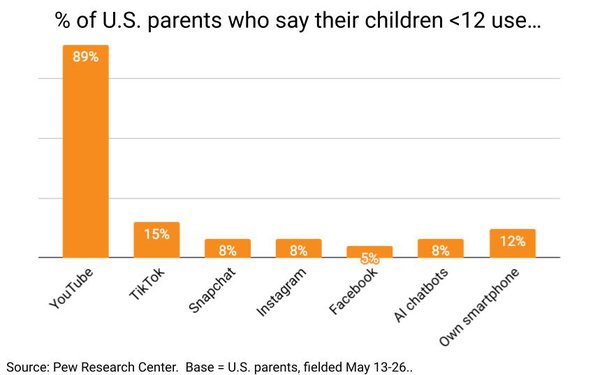
Pew Research Center released this morning
released another in a series of important studies benchmarking the media adoption of American children, finding that 8% of kids under the age of 12 now use AI chatbots, according to a survey of their
parents.
I'm not sure what I think of that number, but I don't think it's the most important one to think about in terms of kids use of AI, because the technology is now becoming embedded in
all the forms of digital media screens they use, especially when accessing social media.
I began writing this column last week, before I even saw Pew's new findings, because of OpenAI's
release of Sora 2, its next-generation video generator, which based on my own observations is a new inflection point blurring the lines of media reality. We probably passed that Turing Test a long
time ago, but I have reached my own personal tipping point in which I know longer assume anything I see on a screen is real. I assume it's not until proven otherwise.
advertisement
advertisement
The problem is, as a
journalist, I'm skeptical to begin with. And as a media journalist, I'm relatively knowledgeable about the state of media technology, and I can no longer tell the difference.
Now imagine
you're an impressionable child without the experience or training to vet the reality of increasingly synthetic media experiences?
I thought growing up as a Boob Tube boomer was bad enough, but
I think it's time to call this generation what it is and it's more than just alpha, it's the first generation raised in a world where AI is now ubiquitous and can distort things in ways that defy
classic cognitive reasoning.
It's not just the factual distortions of synthetic media reality, but the emotional ones when you go down the algorithmic rabbit holes of altered realities being
served up on an increasingly screen-dependent generation.
I've shared the story before that in my youth, my seventh-grade class had a course in "mass media," which schooled us on the role
media increasingly played in shaping our minds, as well as society-at-large. Over the years, I've wondered why media studies wasn't a part of most middle school, or even elementary -- maybe even
pre-school -- curriculums, because if kids don't have the education to understand how media affects them, how could they possibly be prepared to deal with it.
I'm saying this now when we are
still at the relatively early stages of AI deployment, but as billions are being poured into its accelerated development. A lot of good will come from that of course, but as we saw from the way the
promise of the early internet played out, sometimes the unintended consequences can be just the opposite of the well-intentioned outcomes.
The internet was once touted as the "democratization
of media," but it has become a platform for undermining democracy.
Look, I'm not naive enough to think American communities are going to come together around a sensible curriculum for media
studies at a time when many districts are rolling back basic education about history and -- dare I say, even literature -- but I think it's the only thing that will help prepare Generation AI for its
future. We owe it to our progeny.
As for the video below, I just wanted to demonstrate how far AI-powered video generation has come in the wake of Sora 2's launch. I don't have access to it,
because it's still invitation-only, so I used HeyGen's avatar generator to turn an old Stan Mack comic strip for
MediaPost into a "live' comic strip version of myself. It's pretty crude, but imagine what can be done a year from now.